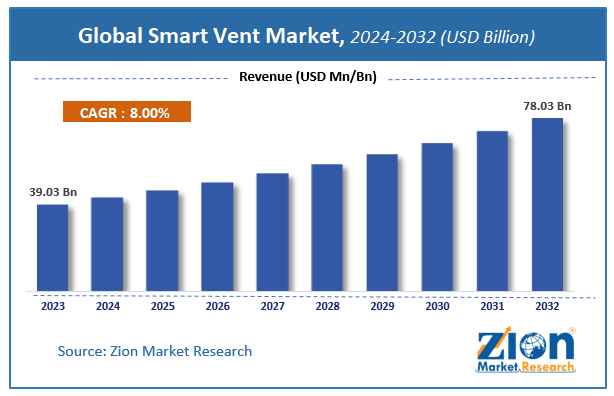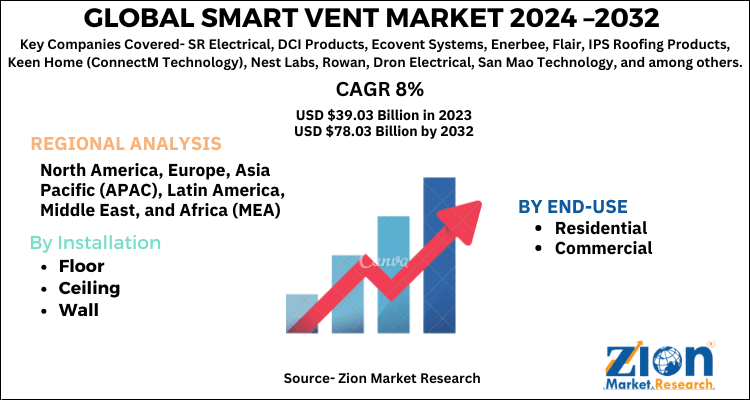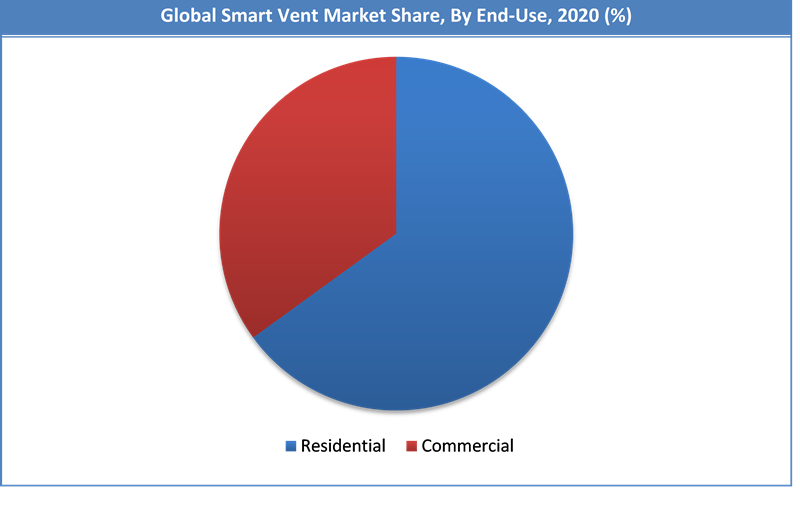Smart Vent Market Size, Share, Growth Report 2032

Smart Vent Market By Installation (Floor, Ceiling, and Wall), By End-Use (Residential and Commercial), and By Region: Global Industry Perspective, Comprehensive Analysis and Forecast, 2024 - 2032
| Market Size in 2023 | Market Forecast in 2032 | CAGR (in %) | Base Year |
|---|---|---|---|
| USD 39.03 Billion | USD 78.03 Billion | 8% | 2023 |
Smart Vent Market Insights
According to a report from Zion Market Research, the global Smart Vent Market was valued at USD 39.03 Billion in 2023 and is projected to hit USD 78.03 Billion by 2032, with a compound annual growth rate (CAGR) of 8% during the forecast period 2024-2032.
This report explores market strengths, weaknesses, opportunities, and threats. It also provides valuable insights into the market's growth drivers, challenges, and future prospects that may emerge in the Smart Vent Market industry over the next decade.
Global Smart Vent Market: Overview
A ventilation system that operates on the basis of the room temperature preference of an individual is called a smart ventilation system. Smart vents are integrated with temperature and pressure sensors, for maintaining a balance between under-conditioned and over-conditioned rooms.
In smart vents, complete ventilation procedure is controlled by smart electronic devices, such as smartphones and tablets. The main motive of a smart vent is to decrease energy usage and overall expense as compared to continuously operating simple ventilation systems without compromising indoor air quality (IAQ).
The penetration rate of innovative technologies and smart devices in the consumer electronics sector is at an all-time rise worldwide. With constant technological enhancements, the number of connected devices is significantly increasing due to their high flexibility and mobility. Thus, the demand for technologically-advanced devices, such as smart vents in smart ventilation systems, is escalating worldwide. Smart vents are compact in size that can be easily installed on walls, floors, or ceilings in a house. These ventilation systems are extremely user-friendly and highly flexible.
Air quality in and around a building is termed as Indoor Air Quality (IAQ). Comfort and health of a building's occupants rely on the IAQ eventually. The globally rising concerns of maintaining healthy IAQ to control health issues are fueling the smart vent market. Smart vents effectively enhance the natural air infiltration to prevent various health problems. Moreover, a smart ventilation system provides both qualitative and quantitative data required for demonstrating procedures that maintain the overall IAQ.
Smart vents attenuate radon particle and prevent smoke entry at a reasonable cost. The global adoption of smart vents is rising to reduce health costs in airtight infrastructure with inadequate ventilation systems. Low awareness of various benefits offered by smart ventilation systems, such as reduced energy consumption, improvisation of IAQ (Indoor Air Quality), may restrain the smart vent market. Many developing economies are unaware of the importance of smart vents and are still relying on traditional ventilation methods.
However, such traditional approaches are observed to be ineffective in the current scenario and are leading to severe health issues. Various emerging localities are unaware that smart vents are not only user-friendly with multiple customized options but also significantly help in lowering different respiratory health issues by maintaining an optimum IAQ level.
Smart Vent Market: Growth Factors
Air quality in and around a building is termed Indoor Air Quality (IAQ). The comfort and health of a building's occupants rely on the IAQ eventually. The globally rising concerns of maintaining healthy IAQ to control health issues are fueling the smart vent market. Smart vents effectively enhance the natural air infiltration to prevent various health problems. Moreover, a smart ventilation system provides both qualitative and quantitative data required for demonstrating procedures that maintain the overall IAQ. Smart vents attenuate radon particles and prevent smoke entry at a reasonable cost. The global adoption of smart vents is rising to reduce health costs in airtight infrastructure with inadequate ventilation systems.
Low awareness of various benefits offered by smart ventilation systems, such as reduced energy consumption, and improvisation of IAQ (Indoor Air Quality), may restrain the smart vent market. Many developing economies are unaware of the importance of smart vents and are still relying on traditional ventilation methods. However, such traditional approaches are observed to be ineffective in the current scenario and are leading to severe health issues. Various emerging localities are unaware that smart vents are not only user-friendly with multiple customized options but also significantly help in lowering different respiratory health issues by maintaining an optimum IAQ level.
Smart Vent Market: Report Scope
| Report Attributes | Report Details |
|---|---|
| Report Name | Smart Vent Market |
| Market Size in 2023 | USD 39.03 Billion |
| Market Forecast in 2032 | USD 78.03 Billion |
| Growth Rate | CAGR of 8% |
| Number of Pages | 210 |
| Key Companies Covered | SR Electrical, DCI Products, Ecovent Systems, Enerbee, Flair, IPS Roofing Products, Keen Home (ConnectM Technology), Nest Labs, Rowan, Dron Electrical, San Mao Technology, and among others |
| Segments Covered | By Installation, By End-Use, and By Region |
| Regions Covered | North America, Europe, Asia Pacific (APAC), Latin America, Middle East, and Africa (MEA) |
| Base Year | 2023 |
| Historical Year | 2018 to 2022 |
| Forecast Year | 2024 - 2032 |
| Customization Scope | Avail customized purchase options to meet your exact research needs. Request For Customization |
Smart Vent Market: Segmentation Analysis
The global smart vent market is further sub-segmented as residential and commercial. Residential contributes about 65% of the total market share for the smart vent market.
Smart Vent Market: Regional Analysis
The North American smart vent market is mainly driven by the rising applications of smart HVAC in residential and commercial sectors. The region’s cold climate is getting colder with every passing year due to global warming. A smart HVAC system in North American countries is mainly utilized for warming the room to optimum temperature. Smart ventilation for ceilings is widely opted in the U.S., Canada, and Mexico for warming house roofs. Construction spending in the U.S. exceeded USD 1.31 trillion. The flourishing construction industry is significantly fueling the smart vent market in the region. The U.S. will hold the largest market share, due to the developing smart home construction industry.
The Asia Pacific is a major smart vent market globally, due to the rising smart home constructions and building automation and global warming. Developing Asia Pacific economies of China and India are opting for technically advanced and eco-friendly solutions like variable refrigerant flow technology. Furthermore, various government regulations, like the Indian Bureau of Energy Efficiency and Labeling Standards, have mandated builders to use smart HVAC devices in their infrastructural projects. Due to the growing global warming, governments of Asia Pacific countries are implementing strict rules for making overall ventilation systems more energy-efficient and eco-friendly along with reducing costs and energy consumption. China is projected to hold the largest smart vent market share, due to its flourishing building automation sector in the upcoming years.
The rising energy-efficient device demand in European countries is driving the region’s smart vent market. European countries are opting for smart ventilation systems for warming their homes. Moreover, the smart vent market will generate lucrative opportunities in Europe over the forecast time period, owing to rising technological enhancements that have resulted in IoT integration with smart vents. Germany will dominate in this regional market, owing to the growing number of smart homes.
Smart Vent Market: Competitive Analysis
Some of the major players in the global Smart Vent market include:
- SR Electrical
- DCI Products
- Ecovent Systems
- Enerbee
- Flair
- IPS Roofing Products
- Keen Home (ConnectM Technology)
- Nest Labs
- Rowan
- Dron Electrical
- San Mao Technology
The global smart vent market is segmented as follows:
By Installation
- Floor
- Ceiling
- Wall
By End-Use
- Residential
- Commercial
By Region
- North America
- The U.S.
- Canada
- Europe
- France
- The UK
- Spain
- Germany
- Italy
- Rest of Europe
- Asia Pacific
- China
- Japan
- India
- South Korea
- Southeast Asia
- Rest of Asia Pacific
- Latin America
- Brazil
- Mexico
- Rest of Latin America
- Middle East & Africa
- GCC
- South Africa
- Rest of Middle East & Africa
Table Of Content
Methodology
FrequentlyAsked Questions
According to a study, the global Smart Vent market size was worth around USD 39.03 billion in 2023 and is expected to reach USD 78.03 billion by 2032.
The global Smart Vent market is expected to grow at a CAGR of 8% during the forecast period.
Some of the key factors driving the global smart vent market growth is the comfort and health of a building's occupants relying on the IAQ. The globally rising concerns of maintaining healthy IAQ to control health issues are fueling the smart vent market
Asia Pacific is expected to dominate the Smart Vent market over the forecast period.
Some of key players in smart vent market are SR Electrical, DCI Products, Ecovent Systems, Enerbee, Flair, IPS Roofing Products, Keen Home (ConnectM Technology), Nest Labs, Rowan, Dron Electrical, San Mao Technology, and others.
Choose License Type
RelatedNews
HappyClients
Zion Market Research
Tel: +1 (302) 444-0166
USA/Canada Toll Free No.+1 (855) 465-4651
3rd Floor,
Mrunal Paradise, Opp Maharaja Hotel,
Pimple Gurav, Pune 411061,
Maharashtra, India
Phone No +91 7768 006 007, +91 7768 006 008
US OFFICE NO +1 (302) 444-0166
US/CAN TOLL FREE +1 (855) 465-4651
Email: sales@zionmarketresearch.com
We have secured system to process your transaction.
Our support available to help you 24 hours a day, five days a week.
Monday - Friday: 9AM - 6PM
Saturday - Sunday: Closed








